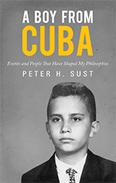
 |
With recollections of the small Cuban fishing village where he grew up, Peter Sust can remember playing ball with Fidel Castro's son, meeting the renowned American writer, Ernest Hemingway, and having the anti-capitalist, guerilla leader, Che Guevara as a neighbor. For the young Sust, it seemed a relatively carefree time. But with military vehicles appearing in the streets and Castro's mounting political takeover, Sust's parents made a wise and conscious decision to send their children out of the country. Soon thereafter, eleven-year-old Sust and his sister, each with five dollars and a 24K gold watch, boarded a plane to start life anew with relatives in the US.
"We came to America to become Americans, and so that is what we worked to do," writes Sust in A Boy From Cuba, as he recounts a life of heartfelt effort and a multitude of lessons learned in adapting to his new and cherished homeland. From assimilating the culture and language, to recognizing knowledge and work as key components in accomplishing life's necessities, Sust presents a rich and inspiring memoir. From early paper routes, to education and technical training, on to military maneuvers and the business world, Sust proves himself as a solid, no nonsense type individual, always willing to work in the interest of reaping the final rewards. In fine balance, fun and laughter, family and friends, and God's constant presence, all play a vital role in rounding out "the good life." Incorporated throughout this autobiographical work, Sust highlights several well thought-out observations about today's modern world. Here the narrative includes an intense commentary about over-indulgent medical practices, misguided parenting, and conflicts within our educational system. Reflective of his sage advice, readers should find Sust's points well-taken. Sust is certainly a thankful man and quick to acknowledge all of the individuals and events that have shaped his life. In particular, he credits the good judgement of a Dr. Hashimoto. In reverence to this man's wisdom during an emergency health crisis, Sust chose to capture his own life's experiences, in the interest of guiding readers toward a more positive outlook. Ideally it represents a sincere pay-it-forward offering.
There is much humor to be found in this book, as the author reflects on his life's journey. He stresses its need in today's society, noting that levity is not meant to negate the seriousness of a situation, but rather that it allows one to move forward. The author credits both his parents for instilling in him this valuable sensibility, and he brings it to light with various anecdotes sprinkled throughout the chapters. Here readers can visualize an immigration inspection that uncovers a suitcase full of fried chicken, laugh at the comic relief of flatulence during Air Force training exercises, and appreciate a father's comments regarding Sust's military assignment away from the conflict of Vietnam. "Be glad you are going to Greenland. Polar bears don't shoot back."
With family and friends playing such a major role in the author's life, it seems only fitting that he include a small collection of photographs that helps put a face to the names. Undoubtedly there are significant memories linked to these personal keepsakes. Among these Sust includes an image of the Cuban passport needed to enter the United States, the deck of Canasta playing cards used to pass the time on his cross-country bus trek from Florida to California, and a letter from an influential customer on his boyhood paper route that helped get Sust's sister into this country.
Far beyond many a memoir that merely gathers data for an interested audience, Sust's story is about self-discovery. There is a commonality in this tale, as generations of immigrants have crossed borders in search of a more promising life. What sets this work apart is the elder wisdom and grounded philosophies that Sust shares. In an engaging, yet down-to-earth style, readers will come away with an understanding of how knowledge, respect, hard work, determination, laughter, and common sense can all come together and lead to a triumphant outcome in striving for the American Dream. A Boy From Cuba may be a small book, but it truly offers great rewards.
RECOMMENDED by the US Review